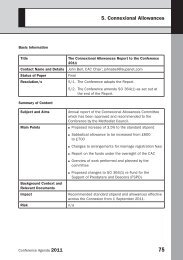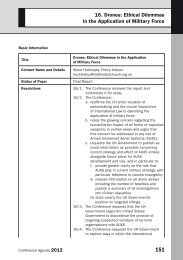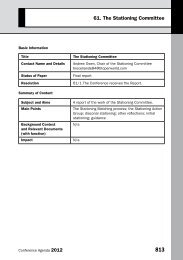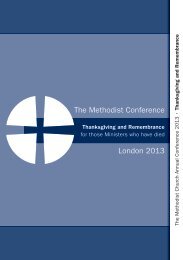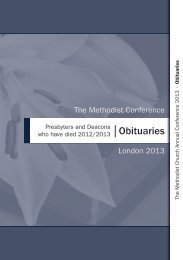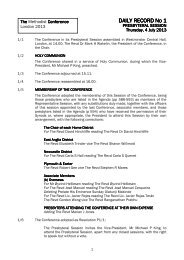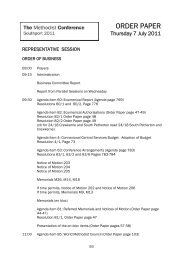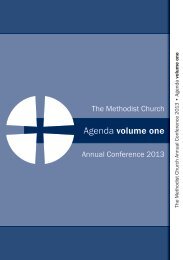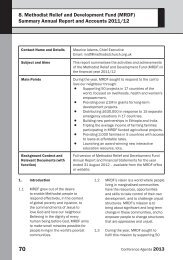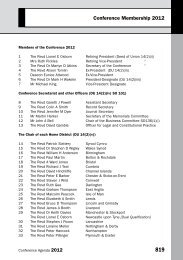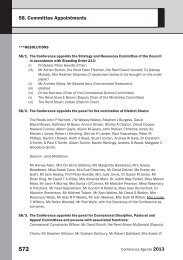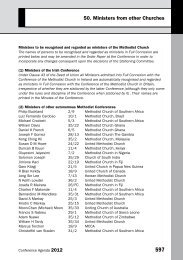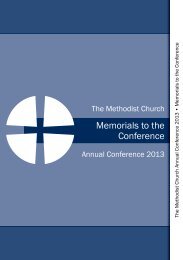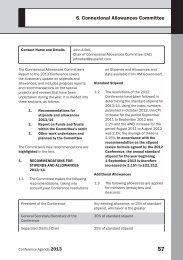Agenda Volume 3 - Methodist Conference
Agenda Volume 3 - Methodist Conference
Agenda Volume 3 - Methodist Conference
Create successful ePaper yourself
Turn your PDF publications into a flip-book with our unique Google optimized e-Paper software.
57. The Fruitful Field Project<br />
used in practice. Written submissions<br />
are relatively easy to administrate<br />
and assess, but the ability to write<br />
should not be equated too closely<br />
with the ability to think theologically,<br />
preach and lead worship. A new<br />
form of assessment will focus on a<br />
portfolio model, making substantial<br />
use of preaching and worship<br />
leading materials, service reports<br />
and reflections, and will rely less on<br />
essay-style questions. This will enable<br />
assessment to focus more closely<br />
on preaching and worship leading<br />
skills, reflection and understanding,<br />
rather than writing skills. By being<br />
attentive to individuals’ personal<br />
discipleship and their knowledge of<br />
the story of the faith, to their skills<br />
as preachers or leaders of worship,<br />
and to their attitude as individuals<br />
who help others to grow as disciples<br />
and to share in God’s mission, this<br />
new form of assessment will also be<br />
both more holistic and more flexible<br />
than Faith & Worship, for example,<br />
allows. It will not be too closely tied<br />
to specific modules, thereby making<br />
it possible to incorporate a range of<br />
study routes and to take account of<br />
prior experience and learning, valuing<br />
the skills and understanding which<br />
learners already have. It will also<br />
clearly recognise that preparation<br />
for becoming a Local Preacher or a<br />
Worship Leader requires formation<br />
as well as study. Supporting Circuits<br />
as they exercise their responsibility in<br />
overseeing those who are preparing<br />
to become Local Preachers and<br />
Worship Leaders will need to include<br />
guidance on their role in deciding<br />
whether a person is suitable, ready<br />
and formed. Portfolio assessment<br />
can become very unwieldy and<br />
burdensome to both learners and<br />
assessors if attempts to ensure<br />
parity of assessment lead to rigidly<br />
defined expectations. Care will need<br />
to be taken to find the right balance.<br />
140 Another key element is the<br />
rebalancing of initial formation and<br />
training and continuing development.<br />
As noted in paragraphs 105 and 109<br />
above, the present heavy emphasis<br />
on initial formation and training can<br />
result in feelings of alienation among<br />
learners, and can be a disincentive<br />
for following a call to preach. It can<br />
also implicitly lead to a diminished<br />
emphasis on continuing development.<br />
An emphasis on accessible and<br />
shared initial formation and training<br />
needs to be accompanied by a<br />
complementary emphasis on, and the<br />
enabling of, continuing development.<br />
Reducing the demands of initial<br />
formation and training and increasing<br />
the expectation for continuing<br />
development need not be a lowering<br />
of standards when seen within the<br />
context of a Network which explicitly<br />
values and resources continuing<br />
(as well as initial) formation for a<br />
wide range of ministries, and the<br />
development of the whole of a<br />
person’s ministry.<br />
141 A final key element is the web of roles<br />
which will be required to support<br />
these redeveloped pathways. Within<br />
the Circuit or the Local Church, a<br />
Preaching or Worship Leading Mentor<br />
<strong>Conference</strong> <strong>Agenda</strong> 2012 699



